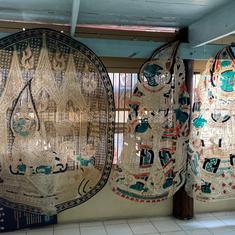Mohan Venkatesan, a daily-wage labourer, drew water out of the main well in Periyakoilkuppam village in Tamil Nadu one day earlier this month. The water was bright yellow, with an oily sheen to it. “Until recently, we were drinking and bathing in this water, because we had no other option,” said Venkatesan. “We have had to abandon three wells because the water is bad. All this happened after the work started.”
Venkatesan was referring to the natural gas extraction plant run by the public sector Oil and Natural Gas Corporation Limited, which began operations in his village in Cuddalore district around four years ago.
The widely-publicised protests in Neduvasal village in the Cauvery basin against a proposed hydrocarbon extraction plant earlier this month seem to have inspired the residents of this village to speak up to highlight the problems they have been facing due to the natural gas extraction plant. After all, the residents of Periyakoilkuppam are living through the scenario Neduvasal villagers are so apprehensive of.
No potable water
The residents of Periyakoilkuppam village have subsisted on agriculture for generations, with groundnut being one of their main crops. However, after ONGC started extracting natural gas from a site in the village in 2013, agriculture has taken a hit.
Now, the borewells in the fields around the extraction unit are either pumping out contaminated water, or have started pumping out sand, rendering them ineffective. “A large chunk of our agricultural lands remain uncultivable because the water supply is affected,” said Marimuthu, a village resident.
Villagers say that the project has also affected the supply of potable water. They say that ever since the extraction of natural gas commenced, the ground water started changing in taste and colour. Even the temple tank, where village children used to play, has an oily feel to it, they say.
Marimuthu said that villagers have had to abandon around four borewells and three drinking water wells so far.
Without agriculture, there are not many viable sources of income in Periyakoilkuppam, and so a large chunk of the village population has been forced to move out of the village. Those who remain say that they now have to rely on a well outside the village to get clean water, but even that does not taste as good as the water they had before the project started. “We have not had clean drinking water in many years,” said Rajasekar, a village resident. “We cannot even bathe in the well water, because it leaves an oily residue.”
Thus, even as the protests against the proposed Neduvasal extraction plant are drawing to an end, villagers in Periyakoilkuppam are considering starting protests of their own to help draw the government’s attention to their plight.

Empty promises
Villagers say that in 1996, when ONGC first started surveying their village for its project, they did not understand what was happening. “The officials came and asked us to lease out around six acres of land to them,” said Jayaram, a landowner. “They came in with government support, and we agreed…Initially they agreed to pay Rs 25,000 per acre per year from 1996 to 2011.”
Jayaram has leased out around one acre of land for which he now receives Rs 60,000 per year.
He added: “When we asked the tehsildar and other authorities what problems we would face, they all assured us that there would be no problems, and apart from the six acres that we leased to ONGC, the village would remain unharmed.”
Villagers say that they were promised better road access and frequent medical camps before the project was set up. But that has not materialised. Neither has the expectation that local residents would be employed to maintain the project grounds.
Protests against the plant in 2013 were in vain.
“Around four years ago, when they started bringing in construction materials, we held protests, but were strong armed into accepting their deal by the local authorities,” said Theekathir, another village resident.
No pollution, says ONGC
Officials at ONGC said that the company had set up the plant to comply with the guidelines of the Tamil Nadu Pollution Control Board. In response to a query on the condition of the ground water in the area, an ONGC statement said: “The plant is being operated after taking consent from Tamil Nadu Pollution Control Board (TNPCB). Air and water parameters are well below the limits prescribed by the Pollution Control Board. Periodical air quality monitoring is being done by Pollution Control Board.”
According to M Karmegam, former director, Centre for Water Resources, Anna University, since oil wells are far beneath the surface, any drilling has to pierce the aquifer. “The damage caused by drilling is not as deleterious as many believe, but there could be some impact to the ground water,” he said.
Villagers to speak up
Villagers accuse local politicians of neglecting the region. “If we had the support of politicians, we would not be in this position,” said T Rukmini, a resident of the village.
T Velmurugan, former MLA from the region, has spent the last couple of weeks protesting against the proposed Neduvasal hydrocarbon extraction project, 180 km away, when this project is in his own backyard. He seemed unaware that ONGC had started gas extraction in Periyakoilkuppam. “After I return from the fishermen protest in Rameswaram, I will look into this problem, and we will see what can be done,” said Velmurugan.
The youth of Periyakoilkuppam village are now seeking support for their cause. “It was only when we saw the Neduvasal protests that we realised the kind of problems that were associated with drilling for oil,” said Mohan, a member of the village’s Agni Siragugal Youth Association. “Unless we take a stand, we will have to suffer in silence.”
The Neduvasal protests have given the people of this village hope. “Maybe it will lead to the authorities taking more interest in our village,” they say.










